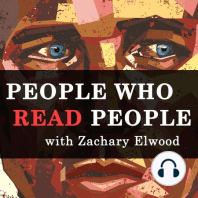75 min listen

Understanding what drives MAGA anger, with ex-Trump voter Rich Logis
FromPeople Who Read People: A Behavior and Psychology Podcast
Understanding what drives MAGA anger, with ex-Trump voter Rich Logis
FromPeople Who Read People: A Behavior and Psychology Podcast
ratings:
Length:
105 minutes
Released:
Sep 11, 2023
Format:
Podcast episode
Description
As someone interested in depolarization, I think it's important to understand the us-vs-them narratives that surround us. This is a talk with Rich Logis (perfectourunion.us), who describes his journey as going "from ultra-MAGA to Never-Trump." Rich was a vocal pro-Trump activist, who'd written many political op-eds and had his own political podcast, and who switched to being very critical of Trump and MAGA in 2021. I ask Rich about the reasons he was enthusiastic about Trump: what the sources of his anger were, and why he viewed Hillary Clinton winning in 2016 as an "existential threat." We talk about the more rational reasons driving Trump support, and why he believes most Trump voters are good people. We talk about the nature of us-vs-them conflict and how it distorts our thinking and emotions. We talk about what led to his abrupt change of mind when it came to Trump and MAGA. Support the showTo get ad-free episodes, and more, get a premium subscription. To learn more about the show, go to behavior-podcast.com. I'm on Twitter at @apokerplayer. See a summary of my work.
Released:
Sep 11, 2023
Format:
Podcast episode
Titles in the series (100)
Reading opponent behavior in the sport of fencing, with Seth Baldwin by People Who Read People: A Behavior and Psychology Podcast